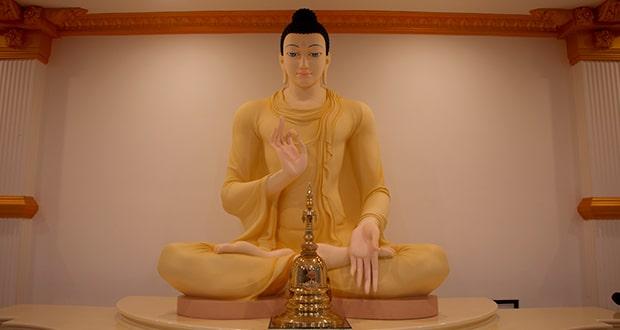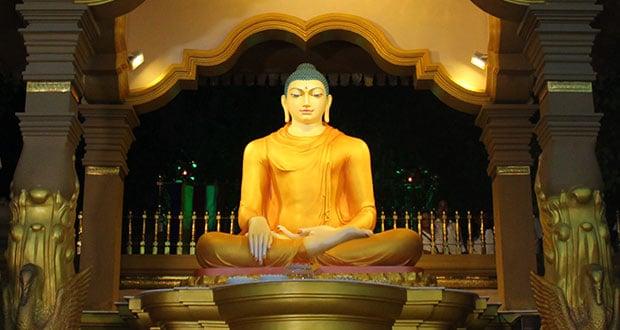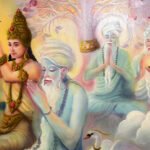The Supreme Buddha is known as the Sammā Sambuddha because he realized (discovered and understood) the Noble Eightfold Path on his own without the assistance of any teacher. During the time of the Gautama Supreme Buddha, other teachers such as Nigandha Nātaputta, Sanjaya Bellatthiputta, Ajita Kēshakambala, Pakudha Kachchāyana, and Makkhali Gōsala falsely introduced themselves as ‘Sammā Sambuddha.’ One day Arahant Mahā Chunda asked the Supreme Buddha why these people who were not truly Sammā Sambuddha also pretended to be one. The Supreme Buddha answered with the following,
‘Mahatī khō Chunda avijjā dhātu.’
‘Chunda, the nature of this ignorance is enormous.’
The Supreme Buddha saw the exact reason for the false pretenses of these people without any difficulty. He had profound wisdom that penetrated through any veil of ignorance. Even when he was a prince, he was always wise and mindful of what was happening around him. When he was born to this world, he was named “Siddhārtha” which means “the one who brings well-being to the world.” Proving that meaning, he saw the reality of this life in a different way from how others saw it. He felt the presence of something more in this life than meets the eye. These thoughts became a reality when he saw an old person, a sick man, and a dead body. “Each and every one of us grows old. The color of this radiant skin fades away, and wrinkles start to appear no matter what we do or how hard we try to maintain it. These muscles deteriorate and we lose strength. Facing problems of this life each day is not pleasant for some of us; weak minds get trapped in those obstacles and become victims of Karma. When the second wave (sickness) hits a person, he may no longer be able to bear the misery that comes with it. At the end like a blossomed flower fades away in the night, that person will leave this life with whatever the Karma he accumulated by performing his actions. If these are the fates of this life, what meaning does it bring? Are not all these things around me and what I feel impermanent? If so, what could this transient joy possibly bring me? Isn’t there a true meaning to life? Isn’t there a liberation from all these sufferings?” Many thoughts pierced the veil of faults of this life and rushed into his brilliant mind like a trapped water streamlet loose to flow again. These ideas about the false existence of this life made him see the truth behind all that is cloaked and hidden by desire, hatred, and ignorance. He saw that there was no point in holding onto this empty life and all its attachments that are prone to decay and die. “What can I do to relieve my life from this ignorance? Is there an end to the suffering? What is the path to relieve these destitute beings from this wretched Samsara full of grief?”
His incredible mind kept asking these questions, and this was when he saw the sublime sight of a monk. He saw a monk walking by who was relaxed but focused on a precise objective in a manner which was not apparent to a normal human eye. The life of a recluse is what he saw on that day. He felt a sudden vibration; his heart started to beat fast, he couldn’t take his eyes from that transcendent sight. “Yes, this is it. This has to be the way. This is the path that I should take.” He quickly realized that this is the pure path that one could use to cross the sea of desire that binds one to Samsara. His brilliance identified this path as the way to free one from all attachments that bring nothing but pain. He saw the possibility of ending the cycle of living a life that ends up with aging, sickness, and death by following this pleasant path. He determined to let go of all worldly pleasures and attachments. Bringing that determination to reality, he took his first step towards becoming the first Arahant. Thus, he renounced the royal palace in which he lived at this time.
Even though humans and gods at that time heard about the future birth of a Buddha, no one was able to help the young recluse in directing him to the right path. He went to some well-known teachers of various views and learned their teachings quickly and easily. But he realized at once that those teachers did not teach what he was looking for. He started to follow a very rough austere life pattern hoping it to be the path to Nibbāna. He practiced many harsh ways for six consecutive years but with no attainment (no achievement of success). One day he realized that neither giving pleasure nor giving pain to the body were correct paths to enlightenment, so he relinquished both extremes and focused on a middle path. On a Vesak Full Moon day, he sat under the Bōdhi tree with a resolute determination to not get up from that place without attaining the Buddhahood. After defeating the Mara and his fellow demons who came to disturb his great attempt to free himself from the dangerous Samsara, he focused his mind on his breathing.
He gradually attained four states of contemplation and acquired the first wisdom which allowed him to recall all his past lives one by one. He understood how long he had been in this Samsara. Then he attained the second wisdom of seeing other beings’ lives (births, deaths, and reincarnations according to the Karma they accumulated). Then realizing the existence of dependent origination (the Paticcha Samuppāda), he freed himself from all defilements that bring repeated births followed by decay, sickness, death and all sufferings. He attained the third wisdom, the Āsawakkhaya Ñāna. Thus, he became the first Arahant of the world. He became the Supreme Buddha…!
The life of this great human being is astounding. His wisdom and skill in teaching the Dhamma that he realized are amazing. The Supreme Buddha expounded his teachings remarkably. The result of such teaching was the attainment of Enlightenment or at least getting a secured life in a higher world with great pleasures.
As this was a humble attempt to support you in learning about our great Teacher the Supreme Buddha, I ask you to read or listen to more discourses preached by the Supreme Buddha and collect merits to your life.
By Chinthaka Silva, Ph.D.
ORNL, USA












Recent Comments